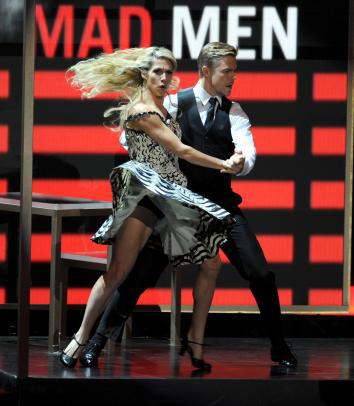Around the time the Emmys had Don Cheadle soberly bring up JFK’s assassination and link it to The Beatles’ appearance on The Ed Sullivan Show in order to shoehorn a performance of “Yesterday” by Carrie Underwood into the ceremony, I thought, There really is something to be said for failing spectacularly: It is not boring.
Our relationship to awards shows is fundamentally amnesiac. Every time one rolls around, millions of viewers excitedly gather round, scope the dresses, sit through the opening sequence, form an opinion about the host and then … get bored and start to complain. And yet, when E! trots out the mani-cam once again, we all gather round as if this next awards show will be different. Well, last night’s Emmys were different: They were the death-obsessed, way-too-meta, “Emmy voters are so wacky they gave Jeff Daniels an Emmy for his performance in The Newsroom” Emmys. Luckily—or is it unluckily?—we have a whole four months to forget them before awards season starts up in earnest once again.
Unlike most failed awards shows, the blame won’t go to the emcee—or not entirely, anyway. Neil Patrick Harris should take a break from hosting, but he’s still no Seth MacFarlane (even if he did smuggle a sex-show joke into his introduction of the Deschanel sisters). His reserves of charming cheerfulness are boundless: The man was somehow smiling after dancing to a mash-up of “Luck Be a Lady” and the Game of Thrones theme song. Last night’s mess can be blamed on some good-in-theory ideas that were terrible-in-fact, plus a couple flat out terrible ideas. (See: that JFK-to-Beatles-to-Carrie Underwood segue and all the jokes involving the word twerk.)
The plan to have celebrities give personalized eulogies during the show was a promising, if slightly shameless scheme. But when Robin Williams, Rob Reiner, and Edie Falco honored Jonathan Winters, Jean Stapleton, and James Gandolfini without showing footage of their work, it drew too much attention to the speaker, not enough attention to the deceased. And as these Hallmarkian segments accrued, death became the night’s big theme—just deserts for all the people who chose to watch the Emmys instead of Breaking Bad, thinking it might be more fun.
The show also explored the outer-limits of meta humor. This year’s intro ignored the nominees almost entirely so Harris could fight with past Emmy hosts about how to host the Emmys. His song in the middle of the show—too clever a placement for its own good—was not about the nominees either: It was about how the song was appearing in the middle of the show. The usual awards-show opener, in which the host does a stand-up routine or song-and-dance number about the nominees, may be predictable, but at least it’s about the nominees. As Harris noted, there is so much TV on now, it’s hard to watch all of it. Most people don’t. But the Emmys didn’t help them out at all, instead cracking jokes about its own format—a celebration of cleverness, not television.
If Modern Family or Breaking Bad had swept as thoroughly as Behind the Candelabra did, it might not have mattered, but the winners came from a huge spread of shows. Some of the surprise winners were beyond deserving—Nurse Jackie’s Merritt Wever, Veep’s Tony Hale, Breaking Bad’s Anna Gunn—but some were not. Laura Linney beating Elisabeth Moss and Jessica Lange? Confounding. Jeff Daniels beating Bryan Cranston? A farce. As the show wrapped up, it was clear we all should have done like Merritt Wever—whose instantly legendary “Gotta go, bye” victory speech was the weirdest and best thing to happen all night—and left too soon, rather than stay up so late.
